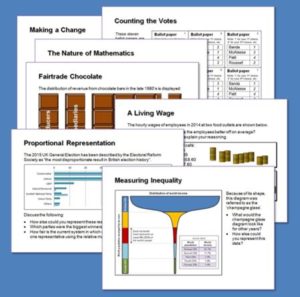One of a series of blogs on ‘building and sustaining active research collaborations with teachers of mathematics’
Written by Pete Wright:
The Teaching Mathematics for Social Justice (TMSJ) Research Group, consisting of myself and five teacher researchers, was established in June 2013. Over the next 12 months we worked collaboratively to design, trial and evaluate a series of classroom activities and teaching ideas. Our premise was that current mathematics teaching too often focuses on factual recall and procedural understanding, lacks meaning and purpose, and alienates and disempowers learners. The aims of the TMSJ Project were to challenge conventional approaches to teaching mathematics by: promoting open-ended and collaborative problem-solving approaches that enable students to make their own decisions about the direction of their learning; using mathematics as a means of inquiry for students to better understand their own social, political, economic and cultural situations; developing a critical awareness amongst students of the value-laden nature and privileged status of mathematics.
The TMSJ Project adopted a Participatory Action Research (PAR) methodology. This involves conducting research ‘with’ rather than ‘on’ participants, with academic researchers and teacher researchers collaborating in a way that recognises the former’s expertise in research design and the latter’s detailed knowledge of the classroom situation. Within PAR, academic researchers play an essential role in encouraging teacher researchers to reflect critically on existing practice and to recognise certain aspects as problematic. My role in the research group was therefore to facilitate, by encouraging teacher researchers to come up with their own ideas to try out in the classroom, and at the same time to challenge, by questioning widely-accepted views about teaching and learning. Thus, I selected research literature relevant to the project’s aims for teacher researchers to present to each other during meetings in order to stimulate discussion on how the theories related to their own practice.

Findings showed how the project impacted significantly on teacher researchers’ thinking and classroom practice. Engaging with critical theories linking mathematical attainment with socio-economic background challenged previously-held assumptions about the nature and purpose of school mathematics. The mutual support provided by the group enabled teacher researchers to identify and overcome constraints they encountered in schools. They began to articulate how mathematical understanding and awareness of social justice issues are inextricably linked and to develop their practice in a direction that they were more comfortable with. Findings also suggested that making mathematics more relevant and meaningful significantly increased student engagement, whilst using mathematics to explore social issues and construct arguments for change leads to increased levels of student agency. The TMSJ Project demonstrated the potential of PAR to transform classroom practice and to promote teachers’ genuine engagement in and with research.
Pete Wright
Lecturer in Mathematics Education
UCL Institute of Education
pete.wright@ucl.ac.uk
